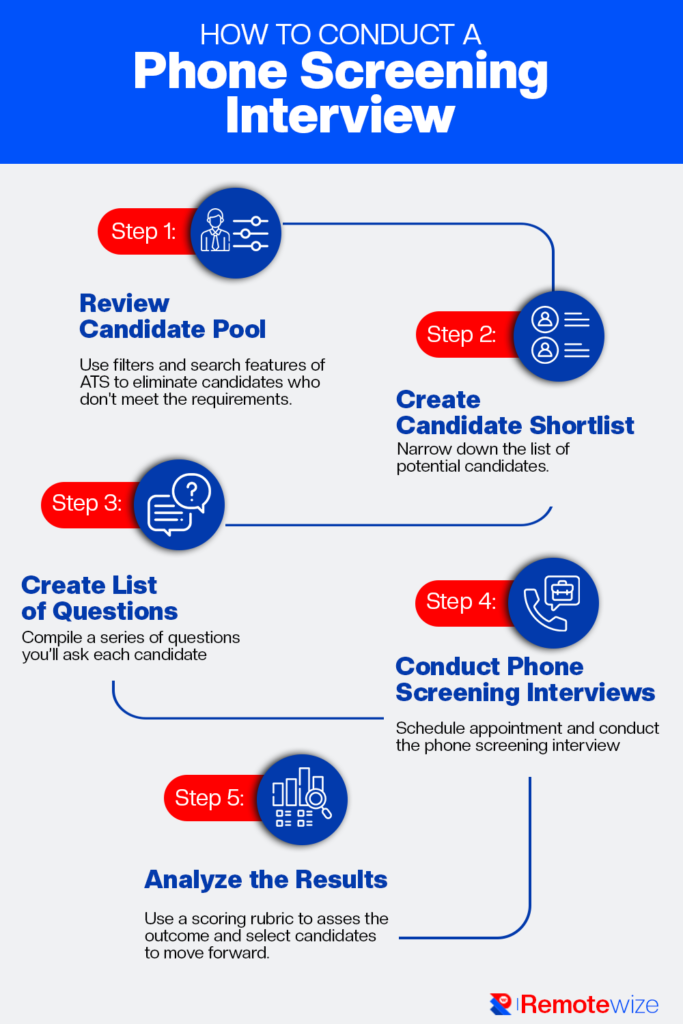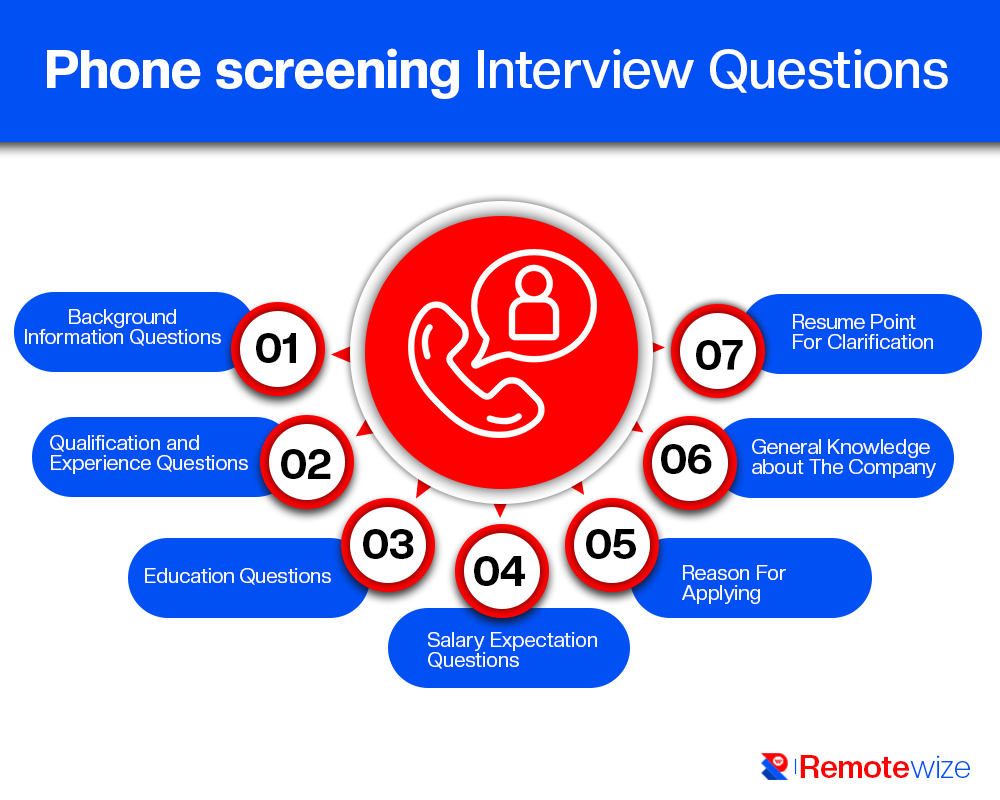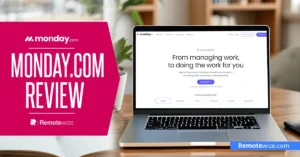You have built a stellar talent pool for your open positions with sharp job ads and strategic recruitment sources. As a result, you’ve got a huge list of qualified applicants to select from. But how do you sift through this abundance? One effective way is to use a phone screening interview.
According to one report, 57% of companies and HR professionals use phone screening interviews. That’s because this tried-and-tested recruitment technique can help pinpoint your top candidates. However, like other things in recruitment, you must do it correctly to see results.
This article will walk you through everything you need to know about phone screening interviews, from what is it and how to conduct it to popular questions you should ask candidates.
What Is A Phone Screening Interview?
A phone screening interview is a quick way to check over the phone if a candidate is a good fit for a job. 5
When conducting a phone screen interview, your focus should be to find out if the candidate has the required qualifications for the job. It probes surface-level queries about:
- Background
- Qualifications
- Education
- salary expectations, and more
Phone screening interviews shouldn’t include in-depth culture testing or job testing. If you dig deeper at this early stage, it might scare the applicant away.
Instead, companies and their HR teams should use these phone screenings to muster more information about the applicant to decide if you want them for an in-person interview or a job test.
Why Should You Opt For Phone Screening Interviews?
When executed properly, phone screening interviews provide a range of benefits, such as:
- They help you screen a great number of applicants personally.
- They help weed out unqualified candidates so you can focus on the best ones.
- They provide you with valuable data about the applicant that helps guide in-person interview questions.
- They allow you to test interpersonal and communication skills early on.
- They help save time and effort.
If it sounds overwhelming, don’t worry – we have a phone screening interview ‘cheat sheet’ to help you.
How To Conduct A Phone Screen Interview: A Step-By-Step Guide
If you’re unprepared, it’s easy to fall short in a phone screen interview.
Since you can’t rely on body language, you should pay close attention to verbal cues. You don’t need to overprepare, but some planning ahead is essential.

When gearing up for a series of phone interviews, it’s best to follow this step-by-step process:
1. Review Your Candidate Pool
Although it can be overwhelming and time-consuming, reviewing all candidates who applied to your available vacancies is crucial. You wouldn’t want a good candidate to fall between the cracks due to applicant overload.
To help ease some of your work, leverage filter and search capabilities in your ATS (Applicant Tracking System) software. Weed out applicants who don’t meet the exact education or experience required.
If required, you can use multiple automatic processes to filter out before manually reviewing leftover resumes.
2. Create A Preliminary Shortlist
After going through the resumes, create a ‘preliminary’ list of candidates you want to talk to. It might be 10 or even 100 people, depending on how many applied and how many you can rule out right away.
Don’t stress if your ‘shortlist’ isn’t really short. That’s why you’re doing phone screening interviews to ensure you find the right fit.
Remember, good screening helps narrow down your list of potential candidates.
3. Create A List Of Questions
Next, you must compile a series of questions you’ll ask each candidate.
Ensure you understand your talent pool, job requirements, and company goals and strategies. This will help create a list of questions that best align with these variables.
In addition, you should keep your phone screen interviews concise – they should last between 20-30 minutes. So, write questions that reflect this timeframe.
Wondering what kind of questions to ask? We’ll explore this shortly.
4. Conduct The Phone Screening Interview
You’ll need to schedule an interview appointment with each applicant, both to be courteous and enable some time to prepare.
There are various options to use. For instance, you can email all candidates directly or use tools such as ATS or booking platforms to send automated requests for interview scheduling.
You can even use SMS – it works and is a preferred choice for millennials.
Call your applicants at a scheduled time, and don’t forget to review the questions you prepared.
Make sure to treat the phone screening interview like a structured interview where you ask candidates similar questions in similar order.
Asking every candidate identical questions during your phone screening allows you to evaluate each applicant objectively. This helps figure out who makes it to the next round.
5. Evaluate The Results
Once your phone screening interviews are completed, assess the outcomes using your scoring rubric.
Then, conduct a second round to narrow down candidates. This time, focus on those applicants you’d like to meet and interview in person.
Now that you know how to conduct a phone screening interview, let’s find out the types of questions you should ask.
7 Phone Screen Interview Questions
Believe it or not, phone screening interview questions help filter out unsuitable candidates.
Your telephone questions should cover the basics, from background information and candidate details to job interest, salary expectations, and any unclear resume points.

Without further ado, here are seven questions to ask during a phone screening interview:
1. Background Information
One of the first things you need to do when starting your phone interview is to ask the applicant to confirm and verify the details on the resume.
This helps ensure you have reliable information for your review and may highlight areas requiring further clarification.
You can frame background queries as ‘yes/no questions’ to confirm the details or allow the applicant to elaborate on their resume.
Make sure to keep it concise and focus on the most essential details like experience or work history. Here are a few questions HR people may ask to candidates:
- What was your most recent job, and what responsibilities did it involve?
- Why did you leave your previous position?
- How does your experience align with this role?
2. Qualification
Dig deeper into the candidate’s skill set and how it aligns with the job requirements.
You can ask questions like:
- Which specific skills and strengths make you a strong fit for this role?
- Can you share an example of how you’ve successfully applied these skills in a previous position?
This helps you evaluate the candidate’s expertise and assess whether they have the essential qualifications for the job.
3. Education
While experience is valuable, education also plays a role in shaping a candidate’s abilities.
So, inquire about their educational background with questions such as, “How has your academic background prepared you for this role?” and “Are there specific courses or projects that you believe are particularly relevant to this position?”
Understanding their educational journey provides a holistic view of their capabilities and how they’ve applied theoretical knowledge in practical scenarios.
4. Salary Expectations
Employers find the salary question important, but candidates often avoid it to keep their negotiation power. You need to determine how much negotiation room you have.
For high-level positions, you may consider meeting the candidate’s expectations. However, you may need to reconsider if you’re hiring for entry-level positions and a candidate requests an overly high wage.
If unsure about financial compatibility, you can revisit the salary discussion later, but don’t waste time if there’s a significant gap between their expectations and your budget.
Here are two questions you can ask:
- What is your current salary?
- What salary are you looking to earn?
5. Reason For Applying
Understand why the applicant wants to join your company. If you know why, it will provide you with valuable insights into how active they will be during the recruitment process and, if selected, on the job.
Keep your questions focused on why they applied, why they’re leaving their current job, what they expect from the new position, and how would they perform and interact with your team.
Here’s a list of questions you may ask during phone screening interviews to find out those answers:
- Why are you interested in this position?
- Why are you leaving your current job?
- What do you think this job offers that your current one doesn’t?
- How do you see yourself contributing to the team?
Remember, it’s an introductory interview. So, maintain a balance between collecting information and not overwhelming the candidate.
6. General Knowledge About The Company
Want to test how prepared the candidate is during a phone screening? Ask questions that help determine how well the applicant knows your organization or the job they applied for.
Make sure to pose open-ended queries that require knowledge about your organization, products, services, and values. This ensures the candidate has done their homework and is genuinely interested in your company.
Some phone screening questions include:
- What attracted you to our organization?
- Can you explain what we do?
- What are our main products and services?
- How do your skills align with the job description?
7. Resume Points Requiring Clarification
Wrap up your phone screening interview by asking specific questions tailored to the candidate you talk to.
If you notice any question marks or red flags on their resume, like extended employment gaps or frequent job changes, ask the applicant about it.
Your goal should be to comprehensively understand the candidate’s background to inform your evaluation.
Final Thoughts
A phone screening interview is a smart way to filter through applicants and find the best fit. Prepare your list of questions and dive into phone screenings – you’re getting closer to that perfect hire!
Ensure that things are fair and consistent with solid interview techniques in every round. Be polite, respect the applicant’s time, and stay focused to nail your phone internet.
Remember, it’s a two-way street – the candidate is sizing you up just as much as you’re evaluating them!
Follow this guide to the T, and you’ll have a candidate that best fits your job description and the position.
Happy recruiting!
FAQs: Phone Screening Interview
What Is A Phone Screening Interview?
A phone screen interview is a one-on-one call with a candidate that involves brief questions to figure out if they’re a good match for the company’s specific role.
What Questions Are Typically Asked In A Screening Interview?
Although questions can vary in a phone screening interview, the most common ones include:
1. Tell me about yourself.
2. What interests you about this role?
3. Why did you leave your previous job?
4. What salary/compensation do you aim for?
How Long Should A Phone Screen Interview Last?
Phone interviews usually last around 20 to 30 minutes, so having a list of questions ready is helpful. This ensures you stay organized and don’t overlook any important details. Practice your questions beforehand to be well-prepared.




